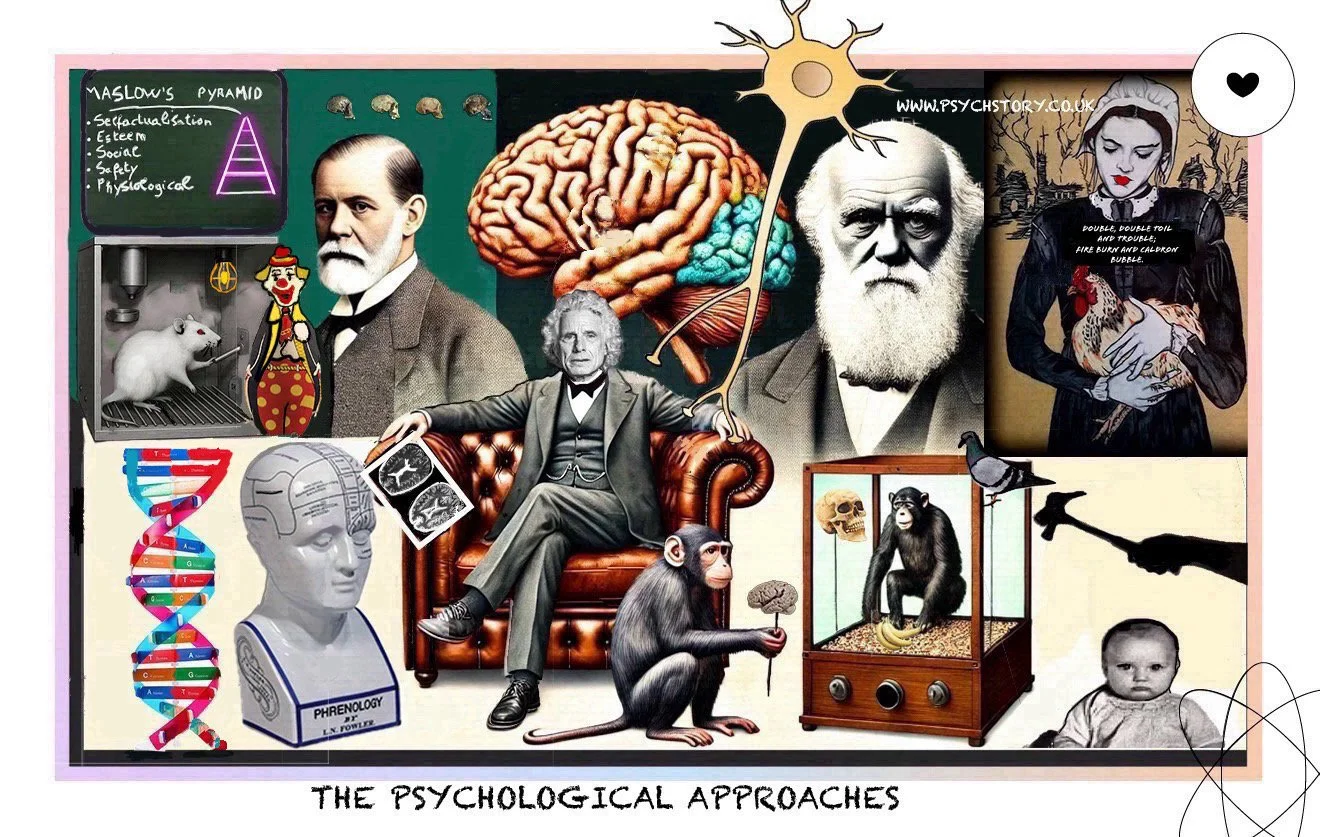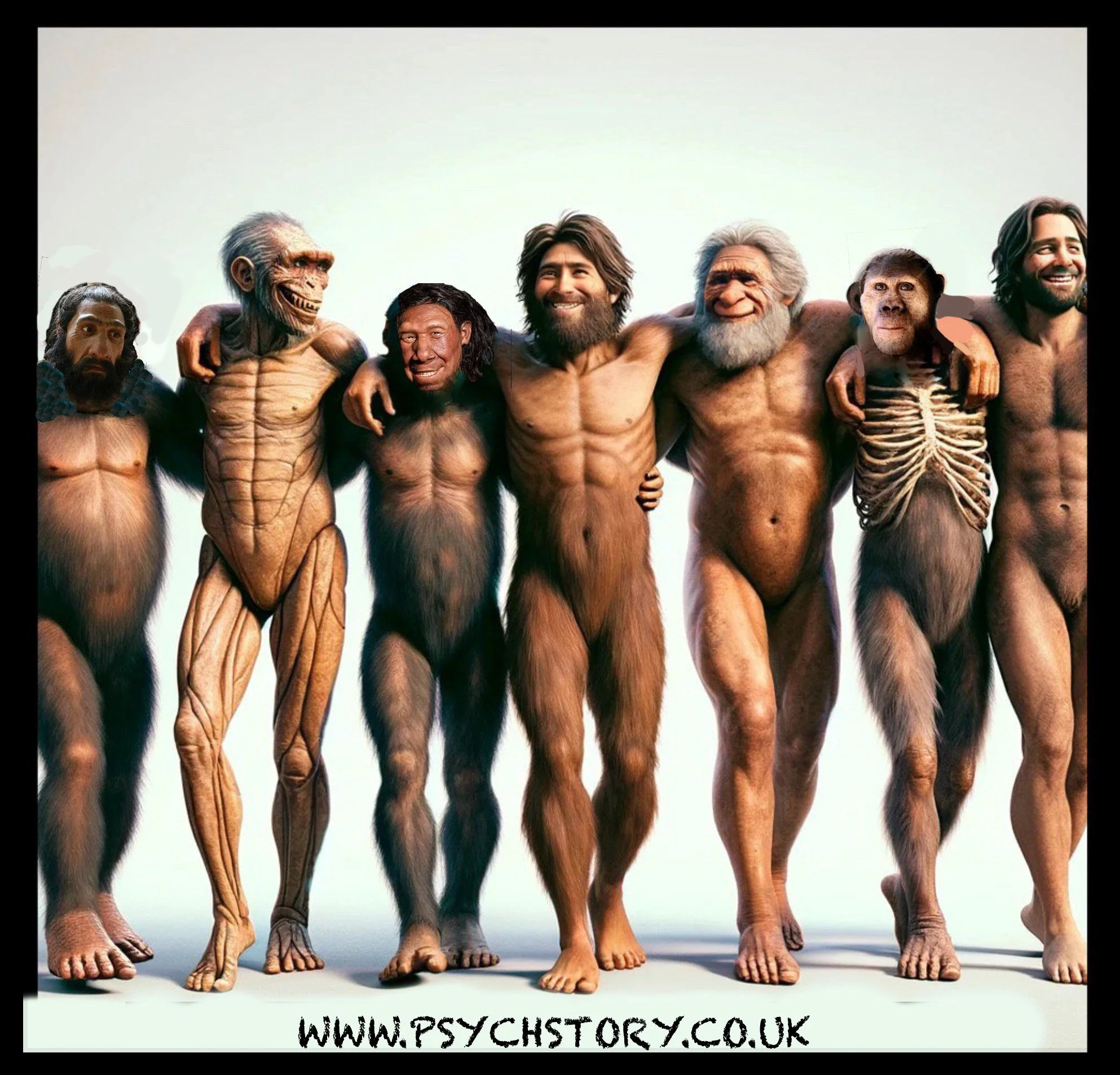INTRODUCTION TO APPROACHES
Approaches in psychology explained clearly and critically: behaviourist, social learning, cognitive, biological, psychodynamic and humanistic. Includes AQA-style summaries of each approach, a worked case study (Stacey Mulligan) analysed from multiple perspectives, and a final discussion of whether psychology can ever become a single scientific paradigm
A TIMELINE OF PSYCHOLOGY
A TIMELINE OF PSYCHOLOGY
Discover the fascinating journey of psychology, from its philosophical beginnings to the scientific discipline it is today. Explore major milestones, key theories, and groundbreaking experiments that have shaped our understanding of human behaviour and the mind.
ORIGINS OF PSYCHOLOGY
ORIGINS OF PSYCHOLOGY: WUNDT
Discover Wilhelm Wundt’s pioneering role in psychology as he established the first experimental lab and introduced introspection. Explore how his work marked the beginning of psychology as a scientific discipline.
THE PSYCHODYNAMIC APPROACH
AN INTRODUCTION TO THE PSYCHODYNAMIC APPROACH
Explore the psychodynamic approach, which delves into the unconscious mind as a key influence on human behaviour. Learn about Freud's structure of personality—Id, Ego, and Superego—and how these elements interact to shape thoughts and actions. Discover defence mechanisms like repression, denial, and displacement, which protect us from psychological distress. This approach also examines Freud's psychosexual stages, revealing how early experiences can impact personality development and adult behaviour. Dive into the fascinating world of the unconscious and its role in shaping who we are.
BEHAVIOURAL APPROACH
AN INTRODUCTION TO LEARNING APPROACHES
Dive into the behaviourist approach, a foundational psychological perspective that focuses on how we learn through interaction with our environment. Discover classical conditioning, exemplified by Pavlov’s research with dogs, and operant conditioning, which explores how reinforcement shapes behaviour, as demonstrated in Skinner’s experiments. Explore the types of reinforcement and how they influence learning and behaviour in everyday life.
SOCIAL LEARNING THEORY
AN INTRODUCTION TO SOCIAL LEARNING THEORY
Uncover the principles of social learning theory, which highlights the importance of observing and imitating others. Explore key concepts such as imitation, identification, modelling, and vicarious reinforcement. Learn about the role of mediational processes in learning and delve into Bandura’s influential research, including his famous Bobo doll experiments, which demonstrate how behaviour is learned through observation.
THE COGNITIVE APPROACH
AN INTRODUCTION TO THE COGNITIVE APPROACH
Discover the cognitive approach, which focuses on studying internal mental processes such as perception, memory, and problem-solving. Learn about the role of schemas in shaping thought and behaviour and how psychologists use theoretical and computer models to explain and make inferences about mental processes. Explore the emergence of cognitive neuroscience, where brain imaging techniques reveal the biological basis of cognition, bridging the gap between psychology and neuroscience.
EVOLUTIONARY PSYCHOLOGY
AN INTRODUCTION TO THE EVOLUTIONARY PSYCHOLOGY APPROACH
Discover how evolutionary psychology explores human behaviour through the lens of natural selection and adaptation. This approach investigates how traits and behaviours, such as social bonding, mate selection, and fear responses, have evolved to solve survival and reproduction challenges faced by our ancestors. By examining the influence of evolutionary pressures on the human mind, evolutionary psychology provides a unique perspective on modern behaviours rooted in our distant past.
THE ETHOLOGICAL APPROACH
The ethological approach to aggression emphasises the role of evolution and biology in shaping aggressive behaviour. Rooted in animal studies by researchers like Konrad Lorenz and Niko Tinbergen, this perspective argues that aggression is innate, adaptive, and universal, serving functions such as defending territory, establishing dominance, and protecting resources. Ethologists propose that aggression is triggered by specific environmental sign stimuli, which activate an Innate Releasing Mechanism (IRM)—a neural process that leads to a Fixed Action Pattern (FAP), a predictable and automatic sequence of aggressive behaviours. This approach highlights the survival benefits of aggression but is criticized for its limited application to human aggression, which is heavily influenced by learning, culture, and individual experiences
THE BIOLOGICAL APPROACH
AN INTRODUCTION TO THE BIOLOGICAL APPROACH
Explore the biological approach, which examines how genes, biological structures, and neurochemistry influence behaviour. Understand the concepts of genotype and phenotype and their roles in shaping individual differences. Learn about the genetic basis of behaviour and how evolutionary principles, such as natural selection, have shaped human and animal behaviour over time. This approach bridges biology and psychology, offering insights into behaviour's physiological and genetic foundations.
THE HUMANISM APPROACH
HUMANISTIC PSYCHOLOGY: AN INTRODUCTION
Discover humanistic psychology, a perspective that celebrates free will and the drive for self-actualisation. Explore Maslow's hierarchy of needs, highlighting the journey towards reaching one’s full potential. Learn about the concept of the self, congruence, and how conditions of worth influence our sense of identity and well-being. This approach’s focus on personal growth and individuality has profoundly shaped counselling psychology, fostering empathetic, client-centred therapy techniques to help individuals lead more authentic and fulfilling lives.
COMPARISONS OF PSYCHOLOGICAL APPROACHES
A COMPARISON OF PSYCHOLOGICAL APPROACHES
Delve into the major psychological approaches and uncover how they compare in their explanations of behaviour. Explore the behaviourist focus on environmental learning, the biological emphasis on genetics and neurochemistry, and the psychodynamic exploration of the unconscious mind. Contrast these with the cognitive study of mental processes, the humanistic celebration of free will and self-actualisation, and the evolutionary perspective on adaptation and survival. This guide highlights the unique methods, assumptions, and applications of each approach, offering a comprehensive overview of psychology’s diverse perspectives.













